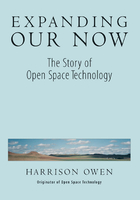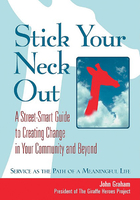A Lamb and the Lion of Life
The striking of a match is every bit as wonderful as the working of a
brain; the union of two atoms of hydrogen and one of oxygen in a
molecule of water is every bit as wonderful as the growth of a child.
Nature does not class her works in order of merit; everything is just
as easy to her as everything else: she puts her whole mind into all that
she does ... [she] lives through all life, extends through all extent,
spreads undivided, operates unspent.
—Stephen Paget
It is 1934, and I am five years old, wild with excitement, trotting back and forth, peering around overall-clad legs bulging with muscle as neighbors with crowbars strain alongside my father to move the frame cottage a quarter mile down the cement highway, on rollers made of old telephone poles, to an acre of land purchased from a neighboring farmer. With the cottage on site and a man on either end of a ten-foot crosscut saw, the poles are soon bucked into short sections. They are buried on end under the jacked-up house, which is slowly lowered, creaking as it comes to rest a foot above the ground on the wooden foundation.
Two hours later, with a four-foot-square wooden porch and steps nailed front and back, we pour into our new house, as beds, chairs, and table are moved from the rented, crumbling, brick house across the lane.There, six children were born, and two of them died, along with a tubercular aunt. In the dusk of the summer evening, the wood-burning iron stove that will do double duty for cooking and heating is installed against a partial wall dividing the single room into cramped sitting and kitchen space. One by one, the neighbors shoulder their tools and trudge into the night to shouts of “thanks” and replies of “welcome.”
Later, as the vast, velvet night and billions of stars arc over our acre, my sisters and I christen the new house with a game of kick-the-can as our parents prepare supper.Three hours later, dinner over and dishwater flung out the back door, six people edge their way onto wall-to-wall beds on the screened porch. I tumble into the iron crib, which seems to have shrunk by half since I was a baby, forcing me into a curl of comfortable sleep.
The next morning, I trot happily behind a tall, god-like father a quarter mile through fragrant locust trees to the neighbor's flowing well, breathing the pungency of crushed peppermint snatched from the ditch bank.The five-gallon can is slowly filled and shouldered by my father for the return trip, as he proudly explains that there'll be no stale, piped water in our house.We'll have “walking water” from an artesian well. “Nothing finer.”
That winter, screens of the sleeping porch have been replaced by glass. Outside, icicles hang from eaves to snowcovered ground. I often weigh an extended bladder and cramping bowel against a fifty-yard dash between three-foot snowbanks to the icy outhouse. “Nothing finer,” according to my mother. Teaches one to “attend to business and not dawdle.”
Earlier this evening, with great fanfare, my mother produced her special treat, “rich man's soup.” Hot water, bread, salt, pepper, and a dollop of melting butter. “Nothing finer,” of course. No food “spoiled with fancy sauces” for this lucky bunch. It is years before realization dawns that there may have been no other food in the house.
A hint that we are not the most fortunate of people and a hundred homilies lurking in the parental mind leap out to assault my ears. “Riches are not in the number of possessions, but the fewness of wants.” “Pretty is as pretty does.” “Wish not, want not.” “Money's manure, no good unless you spread it.” “The road to hell is paved with good intentions.” They buzzed about like flies and I hated them. Very much against my will, the intuitive wisdom of centuries was being handed down.
It was there, in that tiny cottage in the small farming community at the edge of the Rocky Mountains, that the three great loves of my life arose—literature, nature, and a lovely girl with beautiful brown eyes.They would have everything to do with the unorthodox ideas that led to the creation of Visa, although I could not know so at the time.
When and how I learned to read is lost to memory. Ours was not a bookish family. My parents considered themselves lucky to have graduated eighth grade before pride and necessity drove them to earn their own living.Where the books came from, I have no idea. Probably from people who knew “the Hock boy's a little strange. He'll read anything.”
One of the most powerful memories of those early years is countless hours curled on my side in my favorite place—the floor in the corner next to the warm wood stove—face propped up on my left hand, right hand turning pages of a book.The radio is muttering across the room and the family to one another as they crowd around it. I've gone to another place and hear nothing.
Night after night my mother pulls me from the pages of a book, opens the oven door, removes a round, fifteen-pound rock, wraps it in flannel, carries it to my bed, and slips it between the sheets. “Nothing finer,” of course, than an icy room and cold feet on a hot rock for a kid anxious to again disappear in the pages of his book.
It is easy to know where the second grand passion, love of nature, came from. The west face of the Wasatch Range of the hundred-mile-wide Rocky Mountains dropped precipitously to the strip of farmland, orchards, tiny village, and our cottage nestled on the foothills below the towering peaks.West of the cultivated land, miles of alkali marshes stretched flat and unbroken until they met the barren shores of the Great Salt Lake.
Rivers and streams of fresh, cold water from snowbanks deep in the mountains tumbled and fell through boulder-strewn canyons bisecting the sheer, mile-high face of the mountains.They slowed as they met the alkali flats, picking up silt until they became turgid, brown sloughs imperceptibly wandering westward to merge with the Great Salt Lake. The whole of it was a haven for wildlife.
Vast hours and days in the midst of such magnificence, often wandering alone, are impossible to describe, nor can words convey the abiding love of nature and deep, intuitive sense of connection to the Earth and all therein that were aroused.
Love me as they will, there is a growing feeling of estrangement from family; a feeling of not belonging. No one shares my passion for reading or wandering alone. No one directs them either. I live largely in a private world of nature, ideas, and imagination. There was a completeness to life then. An inarticulate sense of the universe and all it contained as a living, breathing, fragrant whole.Money was scarce, but value was ample. Getting was hard, but sharing was easy. Possessions were scant, but love was abundant. Is that when the seeds of obsession with relationship and connection were sown? Is that where aversion to rational, mechanistic ways of thinking sprouted and took root?
There was no way then to know how the passion for literature and love of nature would sustain me through years in the ticktock world of business, or how they would shape beliefs about institutions and the people who hold power within them. But they did.
Nothing in my first six years prepared me for the shock of institutions.With school and church came crushing confinement and unrelenting boredom. To a child passionately in love with nature who lived in imaginary worlds, the reality of institutions was pure misery. I had no words for it at the time, but the feeling was powerful, often overwhelming. It was as though everyone began to shed wholeness and humanity at the door of institutions, along with their coats and overshoes. Adults suddenly turned in a mob to confront one; “Alright kid, you've had the joy of life for six years.That's enough. Grow up. Learn what life is all about.” Failure to conform brought discipline, accepted without realization it was often a form of abuse. One day in particular is burned in memory.
Sunday, 1941, I walk along the road on a bitter-cold winter morning, blown snow swirling like fine white sand as the wind works assiduously to build drifts. I am on the way to church to serve sacrament with other deacons, preteen boys on the first step of the patriarchal lay ladder of church officials. At the crossroads, diminutive, crotchety old Joe in his white apron is alone behind the counter and half-dozen stools in the warmth and light of his one-room café.Along with a two-pump gas station and small grocery, it passes for the center of town.
“Hey kid, get in here!” Old Joe is standing in the doorway, scowling in my direction. “Get in here. I can't keep the damned door open all day!” Oh my God, he means me! What have I done? This is not a town or a time for disrespect of elders, let alone disobedience. I reluctantly cross the street and enter, engulfed by warmth and the smell of hot food. Joe is busy at the grill, scowling over his shoulder as he snaps, “Sit down.” Moments later he turns, a smoking plate of eggs, ham, and hot-cakes in hand. “Eat!” I'm not the smartest kid in my class, but eat is something I do understand. Momentary panic—I have no money. Does he expect me to pay? This is no time for indecision. He said eat and I do, with a vengeance.
“On your way to church?”
“Yup.”
“Uh-huh.Thought so. Well,if you're gonna spend all morning with hypocrites, you'll need all the strength you can get. Have another hotcake.” As the last bite disappears, he throws open the door and barks, “Get movin', you're gonna be late.” The storm seems more friendly as I climb the hill, looking back to see Joe's dwindling figure scowling through the window.
An hour later, we are lined in the back aisle of the church, the organist pumping out a hymn as an elder blesses the sacrament, bits of bread and small paper cups of water on glass plates suspended from wire handles.We march forward to be handed a plate and fan out down the aisle to pass them through the congregation. Ancient Mr. and Mrs. Jones sit on the bench that is my lot. He is enjoying a wee nap, jaw drooping, as spittle leaks from the corner of a slack mouth. She accepts the plate, partakes, elbowing him in the ribs as she turns. His eyes fly open, his hand flies up and it happens. In the deep silence of the church the plate crashes to the floor. In a flash, the elderly Mrs. Jones snatches the handle from the midst of shattered glass and bits of bread and shoves it into my hand.
Every eye in the church turns to stare. The silence speaks. “Guilty! You have smashed the sacrament! The evidence is in your hand!” In that frozen moment, no one knows what to do.A friend loses his cool and giggles. The church fills with suppressed guffaws. But the unctuous, rotund superintendent of the Sunday school is not smiling. He is slowly swelling with the wrath of God. Days seem to creep by before the sacrament is finished, the handle is out of my hand, and the organist has launched a march, signaling the congregation to move to classrooms in the back of the building.
Practicing invisibility in a corner of my class is no protection.The door bursts open and the rotund superintendent enters. He fixes me with an icy stare as the tirade begins. “Blasphemy!— flesh of the father trampled—nothing humorous about—on your knees to pick up—lack of respect—should have this, should have that.” His bladder of righteousness is bursting as he spews words of condemnation. It would hurt less if he used a whip. I say nothing and endure, but questions will rise. Why wasn't he on his knees picking up after it happened? Why does he turn a reprimand into a performance? Why did he not then behave as he now commands? Has he no interest in what actually happened—does he care nothing about the truth?
Walking the mile home in sullen, burning silence, something in the back of my mind began to simmer, which over the years boiled over. What is this chasm between how most institutions profess to function and how they actually do; between what they claim to do for people and what they actually do to them? What makes people behave in the name of institutions in ways they would never behave in their own name? Church, school, government—all the same. What is this difference between Joe and the Super? Joe in his tiny café, crotchety and generous. The Super in church, unctuous and abusive.
Nothing in nature feels like church or school. There's no black bird “principal” pecking away at the rest of the flock.There's no “super” frog telling the others how to croak. There's no “teacher” tree lining up the saplings and telling them how to grow. Something's crazy! Is it me? I can't begin to think about it in a coherent way, let alone understand the resentment, confusion, and doubt. But the sense that something has gone awry is powerful. I look up at the massive, mountain peaks under their mantle of snow towering a mile into the pale winter sky.They are not troubled.The turmoil gradually subsides.
Mind and body returned to the church from time to time, but heart and spirit—never! To Joe's we returned whole and happy many times, until the day of his death, and beyond.
Over the years, as Old Monkey and I puzzled over an ancient, fundamental idea, the idea of community, memory of those early years was ever present. In time we came to believe that the essence of community, its very heart and soul, is the nonmonetary exchange of value. The things we do and the things we share because we care for others, and for the good of the place. Community is composed of things that we cannot measure, for which we keep no record and ask no recompense. Since they can't be measured, they can't be denominated in dollars, or barrels of oil, or bushels of corn—such things as respect, tolerance, love, trust, generosity, and care, the supply of which is unbounded and unlimited. The nonmonetary exchange of value does not arise solely from altruistic motives. It arises from deep, intuitive, understanding that self-interest is inseparably connected with community interest; that individual good is inseparable from the good of the whole; that all things are simultaneously independent, interdependent, and intradependent—that the singular “one” is inseparable from the plural “one.”
The nonmonetary exchange of value is the most effective, constructive system ever devised. Evolution and nature have been perfecting it for thousands of millennia. It requires no currency, contracts, government, laws, courts, police, economists, lawyers, or accountants. It does not require anointed or certified experts of any kind. It requires only ordinary, caring people.
In a true community, unity of the “singular one” and the “plural one” applies as well to beliefs, purpose, and principles. Some we hold in common with all others in the community. Some we hold in common with only part of the community. Others we may hold alone. In true community, the values others hold that we do not share we nonetheless respect and tolerate—either because we realize that our beliefs will require respect and tolerance in return, or because we know those who hold different beliefs well enough to understand and respect the common humanity that transcends all difference.
True community also requires proximity—continual interaction between the people, places, and things of which it is composed. Throughout history, the basic community, the fundamental social building block, has always been the family. It is there that the greatest nonmonetary exchange of value takes place. It is there that the most powerful nonmaterial values are created and exchanged. It is from the community called family, for better or worse, that all other communities are formed.
Without any one of the three—nonmaterial values, nonmonetary exchange of value, and proximity—no true community ever existed or ever will. If we were to set out to design an efficient system for the methodical destruction of community, we could do no better than our present efforts to monetize all value and reduce life to the tyranny of measurement. Money, markets, and measurement have their place. They are important tools indeed. We should honor and use them. But they do not deserve the deification their apostles demand of us, before which we too readily sink to our knees. Only fools worship their tools.
At thirteen, I rebelled. Not the overt, in your face, rebellion so common today. At that time and in that place, it would have been rewarded with a choice between two years in reform school or four years in the army. It was persistent, stubborn, at times stupid refusal to accept orthodox ideas, be persuaded by authoritarian means, or seek acceptance by conformity.
Much as I detested confinement and rebelled against it, it was in a fifth grade classroom that my third great passion and greatest of good fortune came. In the way of all young boys craving attention from girls, I slyly slipped my hand onto the desk behind, to tip her books to the floor.Without so much as acknowledging my presence or the slightest change of expression in her magnificent brown eyes,with her fingernails, she put four bloody, crescent moons in the back of my hand. We've been together every step of the way since. Whether, without Ferol, I would be writing this book is very much in doubt. One thing is certain, I would not wish to be.
The years passed alternating between the magnificent mysteries of nature, the imaginative joy of books, the dull reality of institutions, and work, work, work. From time beyond memory, both Ferol and I had chores to contribute to the welfare of our families. At ten, I was hand-harvesting fruit and vegetables at a penny the pound while Ferol labored to help her father on a small, hardscrabble farm. At twelve, I was at stoop labor thinning sugar beets at twenty dollars the acre.That was followed by a first salaried job at farm labor for twenty cents the hour. The first nickel raise to a quarter was a proud moment, remembered still.
At fourteen, a forged baptismal certificate claiming sixteen brought a job dumping slop in a canning factory. Summer and after-school jobs came one after the other: mucker at a dairy, hottar chain dipper under 100-degree sun, orchard spray-truck operator, hod carrier, laborer in the offal department of a slaughterhouse. None of it seemed demeaning. It was life. It was making a living. It was what proud men did, without whining. “Root, hog, or die” was the homily of the day.
Hunting and fishing were also a way of life, and major source of food. Deer, elk, pheasant, ducks, geese, and rabbit continually found their way to the table, and I was only too willing to be the gatherer. In the fall of my fifteenth year, two pals and I carefully planned the opening day of duck season. We would drive in the dark to the end of a dirt road in the middle of the marshes bordering the Great Salt Lake and wait for dawn. As it grew light, flocks of ducks and geese would rise from the lake and head east across the marshes to feed in the farmland.We would be waiting.
When we gathered in the cold, dark morning, we were four, not three. My pals had invited a new boy who had moved to an adjacent farm only a week before, loaning him a doubled-barreled, twelve-gauge shotgun. Full of excitement and laughter, we drove west in a dilapidated farm truck. My pals would work farther into the marshes in one direction; Ralph, the new boy, would row the boat down the slough in another; and I would keep pace along the shore.
It was a cold, clear morning as light gathered over the mountains far to the east, gradually revealing the vast, flat miles of salt grass and bullrushes that stretched in every direction. There was splendid, absolute silence except for the occasional creak of oars and crunch of my footsteps on a skiff of frozen snow. A flock of ducks rose far to the west and moved swiftly in our direction. I called softly to Ralph, pointing them out. He rowed hurriedly to the far bank. They were moving steadily toward us as he leaped from the boat, turned quickly and reached for his gun, grasping it by the barrel and jerking it toward him.The hammer flipped on the side of the boat. WHAMM! The sound of the shot echoed and reechoed over the deathly silence of the marsh. He dropped the gun and grabbed his left hand with his right, clutching both to his chest. My mind flashed. “My God! He shot off his hand!”
Straightening, he screamed, “I got it, boy, I got it,” took four staggering steps up the muddy bank, and pitched onto his face. Blood cascaded down the bank. It wasn't his hand. An ounce and a half of lead shot had shredded his heart.
As I tore frantically at bulky boots and clothing, a figure appeared moving swiftly down the far bank, racing toward Ralph. The stranger brought Ralph across the slough in the small boat in the midst of a universe paralyzed by the sound of the gun. He quickly left to report the accident, trotting across the vast, flat expanse until he dwindled away to nothing.
In the vast, silent expanse of the barren marsh, time froze under that clear, cold morning sky. Nothing existed, not a single thing, except a boy standing alive, staring at a boy lying dead.
An eternity later, small figures appeared in the distance, growing larger as they ran toward us, gathering around the boat, among them a father and mother sobbing inconsolably as they bent over their only son. I knew him for only three hours, one alive and two dead. It was not apparent then, but in those three hours everything changed. The relevance and importance of everything shifted. Never again could I think a thought, ask a question, or hear an answer in quite the same way. Answers became less important, while questions grew in profusion. The need to know slowly dissolved into desire to understand. An inward eye began to open.
Old Monkey and I don't remember if that is when our lifelong dialog began in earnest. But we do often return to the events of those days when asking our endless questions about the nature of community and the nonmonetary exchange of value. In time, we came to realize that there can be no civil society worthy of the name without true community. In fact, there can be no life without it. All life, all of nature, all earthly systems, are closed cycles of nonmonetary exchanges of value, save only the gift of energy that comes from the sun. There can be no life whatever without balanced cycles of giving and receiving.
When we attempt to monetize all value we methodically replace the most effective system of exchanging value for the least effective. Because we cannot mathematically measure the nonmonetary, voluntary exchange of value, we cannot prove to our rational mind the efficiency of the whole or the parts. Nor can we engineer or control that which we cannot measure. Nonmonetary exchange of value frustrates our craving for perfect predictability and control that monetary exchange always promises but can never deliver.
When we monetize value, we have a means of measurement, however misleading, that allows us to calculate the relative efficiency of each part of the system. It doesn't occur to us that we are destroying an extremely effective system whose values we can't calculate in order to calculate the efficiency of an ineffective system. It doesn't occur to us that attempting to engineer mechanistic societies and institutions based on mathematical measurement may be fundamentally flawed. As the popular dictum declares, “What gets measured is what gets done.” Perhaps that's precisely the problem.
Giving and receiving can't be measured in any meaningful sense. A gift with expectation is no gift at all. It is a bargain. In a nonmonetary exchange of value, giving and receiving is not a transaction. It is an offering and an acceptance. In nature, when a closed cycle of receiving and giving is out of balance, death and destruction soon arise. It is the same in society.
When money's rant is on, we come to believe that life is a right, which comes bearing a right, which is the right of getting. Life is not a right. Life is a gift which comes bearing a gift which is the art of giving. And community is the marketplace where we give our gifts and receive the gifts of others. When our individual and collective consciousness becomes receptive to new concepts of organization which that way of thinking suggests, societal organizations may yet come into harmony with the human spirit and the biosphere. Is that the voice that sings to us now? Is that distant song beginning to be heard throughout the land?
Like most young boys of the time, sports filled part of my life, although hampered by lack of aggression and aversion to the braggadocio, butt-slapping bonhomie of the locker room. The good fortune of a leg muscle damaged at football, along with a perceptive high school dean, brought me to debate with enough success to have some idea of both what it means and what it costs to excel. The state high school debate tournament, arguing alternate sides of a proposition, affirmative and negative, for sixteen consecutive wins and the state championship, brought a strange mixture of disbelief that it could have happened to me, and elation that it did.
It also brought a certificate from tiny Weber Junior College for an annual remission of tuition in the amount of $50. Incredible! I went.The first of my family to advance beyond high school. Ferol could not. She was the eleventh of twelve children raised in a three-room cottage on that small, hardscrabble farm. Only one child had gone beyond high school. Her father died of cancer during her final year of high school. In spite of twelve years of perfect 4.0 grades, she set aside dreams of university and took work as a seamstress in a clothing mill to support a widowed mother and younger sister.
At college, another dean put me in the way of the classics and some understanding of both the powers and limitations of the human mind. At the same time, increasing conflict with the college and other organizations inflamed a growing preoccupation with the paradoxes inherent in institutions and the people who hold power within them.
No doubt those early years in a small mountain town, the intense love of nature, and the shock of institutions began the slow, lifelong process of unraveling some of the paradoxes then tying my life in knots. The seeds of many of the perceptions that shaped my life, some now grown to convictions, were planted then. Events of those high school and college days remain much more vivid and clear than the embryonic thoughts then in gestation. Sharp among them is college graduation.
It is 1949. Officials of the tiny, two-year Weber Junior College are ambitious for increased stature as a four-year school, with a new campus.They are obsessed with impressing the legislature about the ability of the institution and the acumen of its products. The graduation ceremony is planned with meticulous care to impress a plethora of state officials who are to attend.
At commencement, my parents, numerous relatives, and Ferol, the love of my life, are in the packed auditorium to watch the first member of the family to attend college receive an AA degree. Graduates line up in the corridor outside, waiting their turn to cross the stage. Far to the rear someone yells, “Hey, Hock!” Thinking there is ample time, I bolt from the line for a reunion with friends who graduated the previous year.We are rudely interrupted by officials racing down the hall hurling accusations of egregious error and malignant intent for failure to appear as my name was called, over—and over—and over again to an empty stage and ghastly silence.They insist I make an appearance at the end of the line. Nooo way! One thing I have learned is to let bad enough alone. I slip away into the night, later to face the utter devastation of my parents and listen sullenly as my father snaps out the inevitable homily, “Well, there's no point in being stupid unless you can show it.”
Thus, at twenty, newly married, unemployed, eager to learn but averse to being taught, emerged an absurdly naive, idealistic, young man—an innocent lamb hunting the lion of life. The hungry lion was swift to pounce.















